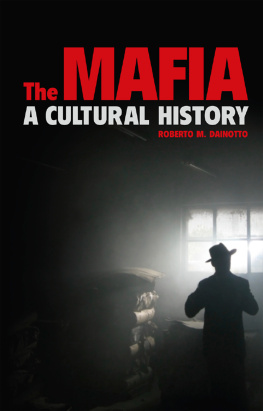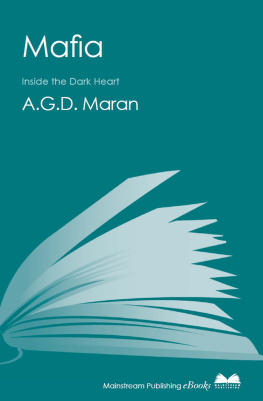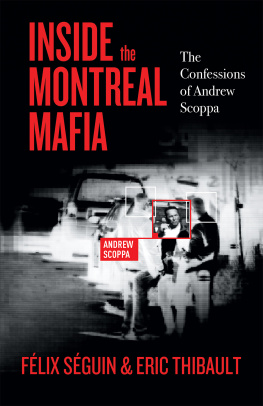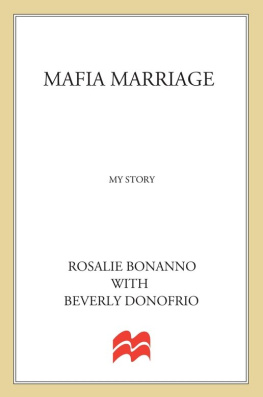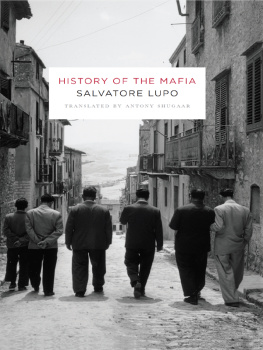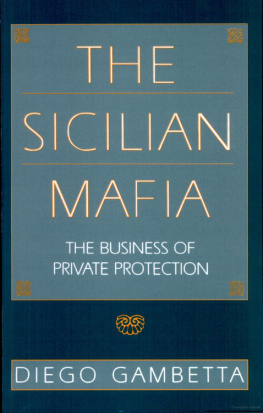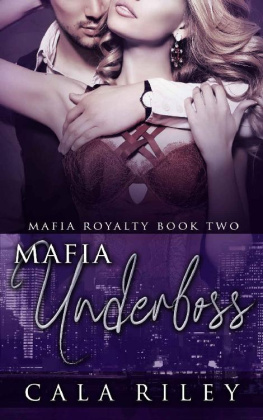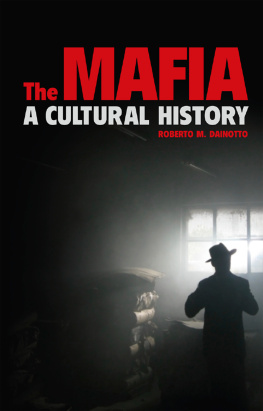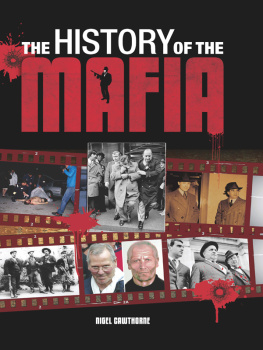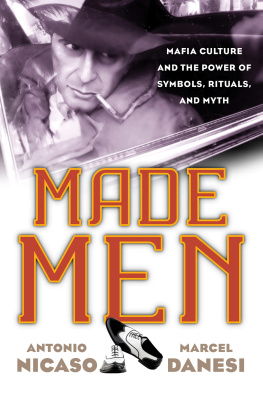THE MAFIA

The MAFIA
A CULTURAL HISTORY
ROBERTO M. DAINOTTO
REAKTION BOOKS
Published by Reaktion Books Ltd
33 Great Sutton Street
London EC1V 0DX, UK
www.reaktionbooks.co.uk
First published 2015
Copyright Roberto M. Dainotto 2015
All rights reserved
No part of this publication may be reproduced, stored in a retrieval system, or transmitted, in any form or by any means, electronic, mechanical, photocopying, recording or otherwise, without the prior permission of the publishers
Page references in the Photo Acknowledgements and
Index match the printed edition of this book.
Printed and bound by TJ International, Padstow, Cornwall
A catalogue record for this book is available from the British Library
eISBN: 9781780234724
Contents
ONE
Of Rustic Knights and Godfathers: The Origin of the Mafia
TWO
From Corleone to Hollywood
THREE
The Far West is Here
FOUR
The Godfather
FIVE
Prime Time
SIX
Avatars
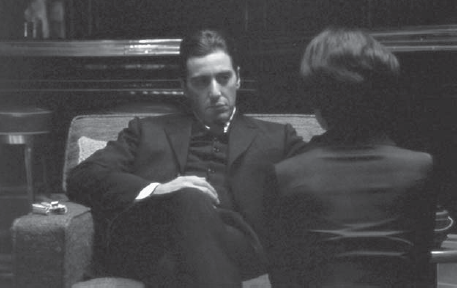
Preface
I know, there have been more depressing editions. But that of 21 October 2013 was certainly not an uplifting one: under the masthead the New York Times one after the other came stories of contaminated milk being sold for infant consumption, soaring anti-Semitism in the West, the rise of Chinas arms industry, the endemic corruption in our financial markets... It was only after the daily dose of gloom and doom that a title finally came, tucked inside the sombre reports on worldly catastrophes, to cast a glimmer of light: Mario Cuomo, Vocal Foe of Italian Stereotyping, Finally Sees The Godfather!
Sure, Cuomo watching The Godfather may not reverse the crisis of the American arms industry or save us all from more credit default swaps not to mention poor infants. It was still, in good conscience, epochal news:
Mario M. Cuomos hatehate relationship with The Godfather has been well documented. For four decades, he refused even to see any of the movies or, presumably, to read Mario Puzos book. He all but denied that the Mafia existed. And who could forget that unfortunate slip of the tongue during the 1992 presidential campaign, when Bill Clinton suggested that Mr Cuomo, then the governor of New York, acted like a Mafioso? But over the weekend, Mr Cuomo, 81, did the unthinkable: he finally watched The Godfather. And, somewhat grudgingly, he offered that maybe this thing was a masterpiece.
Born and raised in Sicily, I admit to being quite familiar with Mr Cuomos grudge a grudge, mind you, that has not fully dissipated as I write these pages. I still feel torn between pleasure and ressentiment. While utterly unconvinced by Cuomos contention that the existence of the Mafia is a lot of baloney, like him, I am prickly and sensitive about the whole affair of cultural stereotyping. Worse, I confess I understand well why someone might have refused even to see any of the [Godfather] movies or, presumably, to read Mario Puzos book. (But why presumably? Is life without Mario Puzo, with all due respect, truly unconceivable?)
How anyone could enjoy and find entertainment or cultural nourishment in Mafia stories had, for a good part of my life, remained a mystery to me. All but entertaining or culturally satisfying, the Mafia was, for me, a sad and often depressing reality: endemic corruption, nepotistic management of the res publica, illiteracy never completely eradicated, half a million emigrants leaving their Sicilian homes and families year after year, entire cities engulfed in endless sprawls of cement, misery, violence, prevarication and abuse. Nor did the Mafia I knew have anything to do with spectacular ambushes and killings, or with customary wit Leave the gun, take the cannoli despite how the cultural industry seemed determined to represent it. The Mafia was, rather, a prosaic, unheroic, dull, everyday affair.
If you asked me to single out the most realistic representation of the Mafia in any movie I have seen or book I have read, I would have to say that it is the moment in Marco Tullio Giordanas film One Hundred Steps (2000) when mafioso Tano Badalamenti drinks a cup of coffee with Peppino Impastato just before having him murdered. In the movie, Impastato himself seems aware that the real Mafia is hidden precisely in those kinds of small, everyday gestures gestures that, far away from the glossy adventures of Hollywood, always hide real power and submission in the dull rituals of daily routines:
IMPASTATO: You drink coffee at the same bar... Good Morning, Tano. Good day to you, Peppino. My regards to the family... And they are the lords of the city!
The beating heart of the Mafia its real power and lordship was always hidden in the banality of these little gestures, not in the grand deed. The Mafia I knew, in short, had nothing to do with the spectacular dreams of grandeur of Howard Hawkss Scarface The World is Yours or with the lavishness of gangsters lives. That was Hollywood. In Sicily, as in a Dostoevsky novel, the Mafia looked like the devil that visited Karamazov: it always had a shabby, dull and vulgar look.
Peppino Impastato was killed on 9 May 1978 by the Mafia, in the small town of Cinisi near Palermo. On the free radio station that he ran, he had made explicit accusations that the citys boss, Badalamenti, could not tolerate. Impastato was beaten to death, his body then dismembered by a charge of TNT. On the same day Italys ex-Prime Minister Aldo Moro was murdered by the terrorist group, the Red Brigades in Rome. At the movie theatre, in the meantime, Pasquale Squitieris Corleone, an exploitation of the successful Godfather franchise, was selling tickets for one more Mafia show. Impastatos murder, in that context, was neither big news for the national press, nor filmic entertainment. It passed unnoticed. For me, working for a free radio station like Impastatos, 190 km (120 miles) from Cinisi, his death was a different story. The news of his murder had come between the broadcasting of Gloria Gaynors I Will Survive (those were the days) and the always-present (and given the occasion, gloomily allegorical) The End by The Doors. The sour taste of real-life tragedy soon settled in over the music. Then loathing: how could anyone watch one more Corleone movie when this was the Mafia? Like Cuomo, my relationship with Mafia movies was growing to be hatehate.
A few years after that, I cannot remember exactly when, but decidedly before Mr Cuomo, I grudgingly acquiesced to making peace with Mafia movies. You know how these things go: a friend intercedes, brings a DVD (though, in my case, it must have been a VHS) to your home, you put up a fight Lets watch it, Lets not and before you understand what is happening, you are lying on the sofa watching The Godfather with fondness in your eyes. Maybe this thing is a masterpiece! After that Scarface was not bad either, although I preferred the original one to De Palmas over-the-top remake. And then came The Sopranos, which glued me like nothing ever before to the TV set for years on end. Slowly but surely, watching Mafia shows became an impassioned affair.
Was it real peace? Well, passion notwithstanding, I would say it was more like an armistice. My attitude towards the real thing was unchanged, but Mafia movies, and novels too, were a different story. Was it the adventure, the fast-paced action, the shootings? Not quite.

